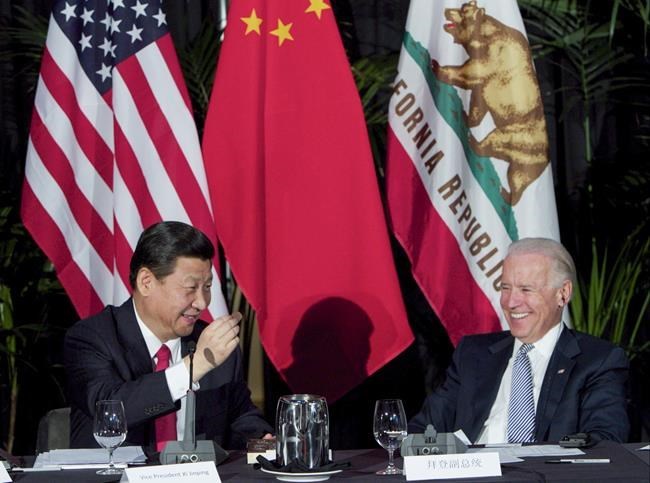WASHINGTON (AP) — President Joe Biden opened his virtual meeting with China’s Xi Jinping on Monday by saying their goal is to ensure competition “does not veer into conflict.”
The two leaders are meeting by video amid mounting tensions in the U.S.-China relationship. Biden has criticized Beijing over human rights abuses against Uyghurs in northwest China, squelching democratic protests in Hong Kong, military aggression against the self-ruled island of Taiwan and more. Xi’s deputies, meanwhile, have lashed out against the Biden White House for interfering in what it sees as internal Chinese matters.
“It seems to be our responsibility as the leaders of China and the United States to ensure that the competition between our countries does not veer into conflict, whether intended or unintended, rather than simple, straightforward competition," Biden said at the start of the meeting.
Xi told Biden the two sides need to improve communication. The two leaders traveled together when both were vice presidents and know each other well.
“I stand ready to work with you, Mr. President, to build consensus, take active steps and move China-U.S. relations forward in a positive direction,” said Xi, who called Biden his “old friend.”
The U.S. president was joined in the Roosevelt Room for the video call by Secretary of State Antony Blinken, Treasury Secretary Janet Yellen, national security adviser Jake Sullivan and national security aides Kurt Campbell, Laura Rosenberger and Jon Czin.
The high-level diplomacy had a touch of pandemic Zoom meeting informality as the two leaders waved to each other once they saw one another on the screen.
Biden would have preferred to meet Xi in person, but the Chinese leader has not left his country since before the start of the coronavirus pandemic.
The White House floated the idea of a virtual meeting as the next best thing to allow for the two leaders to have a candid conversation about a wide range of strains in the relationship.
Chinese officials said Taiwan would be their top issue for the talks. Tensions have heightened as the Chinese military has dispatched an increasing number of fighter jets near the self-ruled island of Taiwan, which Beijing considers part of its territory.
“The Taiwan issue concerns China’s sovereignty and territorial integrity, as well as China’s core interest,” Chinese Foreign Ministry spokesperson Zhao Lijian said Monday. “It is the most important and sensitive issue in China-U.S. relations.”
The White House said Biden will abide by the longstanding U.S. “One China” policy, which recognizes Beijing but allows informal relations and defense ties with Taipei. Chinese military forces held exercises last week near Taiwan in response to a visit by a U.S. congressional delegation to the island.
With Beijing set to host the Winter Olympics in February and Xi expected to be approved by Communist Party leaders to serve a third five-year term as president next year — unprecedented in recent Chinese history — the Chinese leader may be looking to stabilize the relationship in the near term. White House press secretary Jen Psaki added that the “condensing of power” in China made the leader-to-leader conversations essential.
Slowing economic growth and a brewing housing crisis also loom large for Beijing.
At the same time, Biden, who has seen his polling numbers diminish at home amid concerns about the lingering coronavirus pandemic, inflation and supply chain problems, is looking to find a measure of equilibrium on the most consequential foreign policy matter he faces.
Despite his domestic problems, White House officials made the case that Biden was coming into his meeting with Xi from a position of strength.
Earlier Monday, Biden signed into law a $1 trillion infrastructure bill, legislation to upgrade the nation’s crumbling infrastructure that the Democrat argued is crucial for the U.S. as it seeks to retain a competitive edge over China.
“Because of this law, next year will be the first year in 20 years American infrastructure investment will grow faster than China’s,” Biden said. “We will will once again have the best roads, bridges, ports and airports over the next decade.”
The White House set low expectations for the meeting with Xi: No major announcements or even a joint statement were anticipated.
The U.S. president has held up his relationship with Xi as evidence of his heartfelt belief that good foreign policy starts with building strong personal relationships.
The public warmth — Xi referred to Biden as his “old friend” when the then-vice president visited China in 2013, while Biden spoke of their “friendship” — has cooled now that both men are heads of state. Biden bristled in June when asked by a reporter if he would press his old friend to cooperate with a World Health Organization investigation into the coronavirus origins.
“Let’s get something straight: We know each other well; we’re not old friends,” Biden said. “It’s just pure business.”
Xi, however, at the start of the meeting gave a nod to the warmth in the earlier days of their relationship, saying, “I am very happy to see my old friend."
Biden said he expected the two would spend plenty of time discussing areas where there is a gulf of differences, including human rights, economics, and “ensuring a free and open Indo-Pacific.”
“We have always communicated with one another very honestly and candidly. We never walk away wondering what the other man is thinking,” Biden said.
Aamer Madhani And Colleen Long, The Associated Press




